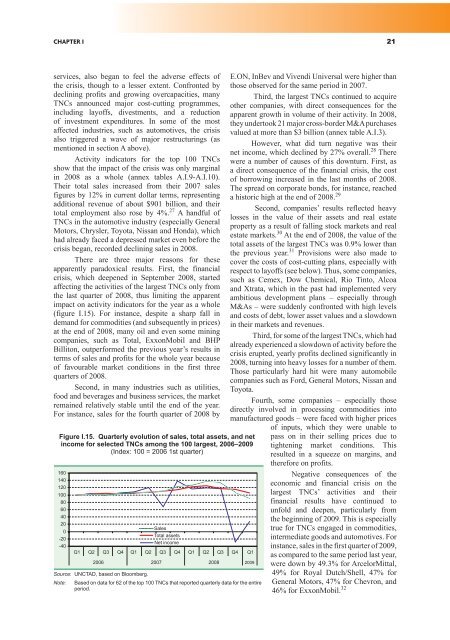World Investment Report 2009: Transnational Corporations - Unctad
World Investment Report 2009: Transnational Corporations - Unctad
World Investment Report 2009: Transnational Corporations - Unctad
Create successful ePaper yourself
Turn your PDF publications into a flip-book with our unique Google optimized e-Paper software.
CHAPTER I 21<br />
services, also began to feel the adverse effects of<br />
the crisis, though to a lesser extent. Confronted by<br />
declining profits and growing overcapacities, many<br />
TNCs announced major cost-cutting programmes,<br />
including layoffs, divestments, and a reduction<br />
of investment expenditures. In some of the most<br />
affected industries, such as automotives, the crisis<br />
also triggered a wave of major restructurings (as<br />
mentioned in section A above).<br />
Activity indicators for the top 100 TNCs<br />
show that the impact of the crisis was only marginal<br />
in 2008 as a whole (annex tables A.I.9-A.I.10).<br />
Their total sales increased from their 2007 sales<br />
figures by 12% in current dollar terms, representing<br />
additional revenue of about $901 billion, and their<br />
total employment also rose by 4%. 27 A handful of<br />
TNCs in the automotive industry (especially General<br />
Motors, Chrysler, Toyota, Nissan and Honda), which<br />
had already faced a depressed market even before the<br />
crisis began, recorded declining sales in 2008.<br />
There are three major reasons for these<br />
apparently paradoxical results. First, the financial<br />
crisis, which deepened in September 2008, started<br />
affecting the activities of the largest TNCs only from<br />
the last quarter of 2008, thus limiting the apparent<br />
impact on activity indicators for the year as a whole<br />
(figure I.15). For instance, despite a sharp fall in<br />
demand for commodities (and subsequently in prices)<br />
at the end of 2008, many oil and even some mining<br />
companies, such as Total, ExxonMobil and BHP<br />
Billiton, outperformed the previous year’s results in<br />
terms of sales and profits for the whole year because<br />
of favourable market conditions in the first three<br />
quarters of 2008.<br />
Second, in many industries such as utilities,<br />
food and beverages and business services, the market<br />
remained relatively stable until the end of the year.<br />
For instance, sales for the fourth quarter of 2008 by<br />
Figure I.15. Quarterly evolution of sales, total assets, and net<br />
income for selected TNCs among the 100 largest, 2006–<strong>2009</strong><br />
(Index: 100 = 2006 1st quarter)<br />
���<br />
���<br />
���<br />
���<br />
��<br />
��<br />
��<br />
��<br />
�<br />
���<br />
���<br />
�����<br />
����� ������<br />
��� ������<br />
�� �� �� �� �� �� �� �� �� �� �� �� ��<br />
���� ���� ���� ����<br />
Source: UNCTAD, based on Bloomberg.<br />
Note: Based on data for 62 of the top 100 TNCs that reported quarterly data for the entire<br />
period.<br />
E.ON, InBev and Vivendi Universal were higher than<br />
those observed for the same period in 2007.<br />
Third, the largest TNCs continued to acquire<br />
other companies, with direct consequences for the<br />
apparent growth in volume of their activity. In 2008,<br />
they undertook 21 major cross-border M&A purchases<br />
valued at more than $3 billion (annex table A.I.3).<br />
However, what did turn negative was their<br />
net income, which declined by 27% overall. 28 There<br />
were a number of causes of this downturn. First, as<br />
a direct consequence of the financial crisis, the cost<br />
of borrowing increased in the last months of 2008.<br />
The spread on corporate bonds, for instance, reached<br />
a historic high at the end of 2008. 29<br />
Second, companies’ results reflected heavy<br />
losses in the value of their assets and real estate<br />
property as a result of falling stock markets and real<br />
estate markets. 30 At the end of 2008, the value of the<br />
total assets of the largest TNCs was 0.9% lower than<br />
the previous year. 31 Provisions were also made to<br />
cover the costs of cost-cutting plans, especially with<br />
respect to layoffs (see below). Thus, some companies,<br />
such as Cemex, Dow Chemical, Rio Tinto, Alcoa<br />
and Xtrata, which in the past had implemented very<br />
ambitious development plans – especially through<br />
M&As – were suddenly confronted with high levels<br />
and costs of debt, lower asset values and a slowdown<br />
in their markets and revenues.<br />
Third, for some of the largest TNCs, which had<br />
already experienced a slowdown of activity before the<br />
crisis erupted, yearly profits declined significantly in<br />
2008, turning into heavy losses for a number of them.<br />
Those particularly hard hit were many automobile<br />
companies such as Ford, General Motors, Nissan and<br />
Toyota.<br />
Fourth, some companies – especially those<br />
directly involved in processing commodities into<br />
manufactured goods – were faced with higher prices<br />
of inputs, which they were unable to<br />
pass on in their selling prices due to<br />
tightening market conditions. This<br />
��������� ��� �� �������� ��� ��������� ����<br />
therefore on profits.<br />
Negative consequences of the<br />
economic and financial crisis on the<br />
largest TNCs’ activities and their<br />
financial results have continued to<br />
unfold and deepen, particularly from<br />
the beginning of <strong>2009</strong>. This is especially<br />
true for TNCs engaged in commodities,<br />
intermediate goods and automotives. For<br />
instance, sales in the first quarter of <strong>2009</strong>,<br />
as compared to the same period last year,<br />
were down by 49.3% for ArcelorMittal,<br />
49% for Royal Dutch/Shell, 47% for<br />
General Motors, 47% for Chevron, and<br />
46% for ExxonMobil. 32

















